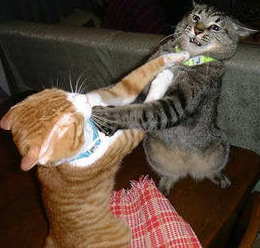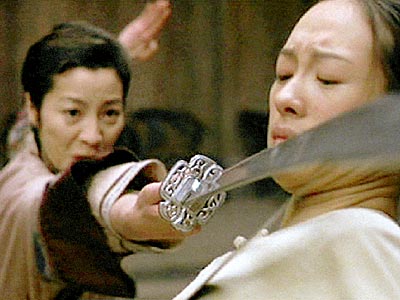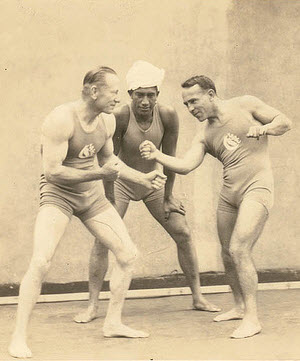On Criticism
JSA Lowe
Apr 13, 2012
Long ago, in a reasonably distant city, I spent a brief, magical, slightly demented three years of my life as a freelance movie critic. Reviewing films was far and away the best job I've ever had. I watched between two and six movies per week and wrote a couple thousand words describing them, and was paid, as all film critics are, in pocket lint and tarnished pennies and love. Alas, one Memorial Day weekend I burnt out dramatically after watching both Mission: Impossible III and X-Men: The Last Stand in a single night, and that was the sad end of my career as a reviewer. (It was several years before I could stand to watch any film made after 1960; I had to start slowly, with silent films/German expressionism, and work my way incrementally forward.) Looking back, I can't believe how much copy I generated--most of it really bad at first, but with time, increasingly competent. My favorite writers on film were Susan Sontag, James Agee, Andrew Sarris, Pauline Kael, Manny Farber, Glenn Kenny: writers who didn't just advise viewers what to seek out and what to avoid, in some consumer-driven sense of criticism as represented by "Roger Ebert's pudgy thumbs." Like them, I wanted to craft real criticism--prose that served its own purposes, stood alone, made observations about the current cultural moment and about the viewer as its attending and participating audience. Reviewing had its temptations, though. As in literary criticism, the hatchet job can be glorious Grand Guignol fun. Trashing bad films becomes especially enjoyable if the movie isn't merely bad but perniciously so. It's that much easier to demolish a work when it's not bien fait, if it has glaring technical flaws or blatant groan-aloud banalities (which is of course why the New Yorker assigns all the blockbusters to Anthony Lane every summer, so that he can merrily make utter verbal hay out of them) (though some of us feel that is rather a waste of Mr. Lane's gifts). Writing a scathing review of something truly awful, the critic hopes not only to save the reader's $12 but also two irreplaceable hours of her life. I say all this by way of preamble to a recent literary kerfuffle around precisely this business of criticism. By now you've read the articles, which have in turn beget further articles: some critics (e.g., J. Robert Lennon) are worried that we're being too hard on new writers; while others (e.g., Jacob Silverman) claim that on the contrary the Internet has made us all far too nice to each other because we're all chums on social media now. (Clearly these people have never been caught up in Facebook "friendly fire" or a 140-character Twitter throwdown.) In general I remain unimpressed by trend stories--especially the attendant scores of follow-up articles on these two pieces, with their assertions that yes, reviewers are too nice! or no, reviewers are too mean! with adjectives straight out of a third-grade spat. When rhetoric devolves to hair-pulling and insulting one another's lunchbox designs, how quickly this becomes uninteresting.
Furthermore, where's the trend? Literary criticism has ever been beset with, on the one hand, cronyism and mutual back-scratching; and, on the other, vituperative evisceration just for the fun of it--or to compete with, or wreak revenge on, another dangerously successful writer. The Internet has but sped up the process, not qualitatively changed it. Think of Dorothy Parker's "anonymous" and deliciously cruel "Constant Reader" column (her infamous review of one of AA Milne's Winnie-the-Pooh books: "Tonstant Weader fwowed up"). In a review of critic Dale Peck, Daniel Mendelsohn notes that critical animus goes back pretty far:
In general I remain unimpressed by trend stories--especially the attendant scores of follow-up articles on these two pieces, with their assertions that yes, reviewers are too nice! or no, reviewers are too mean! with adjectives straight out of a third-grade spat. When rhetoric devolves to hair-pulling and insulting one another's lunchbox designs, how quickly this becomes uninteresting.
Furthermore, where's the trend? Literary criticism has ever been beset with, on the one hand, cronyism and mutual back-scratching; and, on the other, vituperative evisceration just for the fun of it--or to compete with, or wreak revenge on, another dangerously successful writer. The Internet has but sped up the process, not qualitatively changed it. Think of Dorothy Parker's "anonymous" and deliciously cruel "Constant Reader" column (her infamous review of one of AA Milne's Winnie-the-Pooh books: "Tonstant Weader fwowed up"). In a review of critic Dale Peck, Daniel Mendelsohn notes that critical animus goes back pretty far:
Ever since 405 BC, when Aristophanes, in a comedy entitled Frogs, hit upon the sublime idea of staging a literary contest in the Underworld between two dead writers who loathe each other's work (Euripides and Aeschylus), the best literary criticism has often been a form of sadistic entertainment--one that uses comedy's tools (humiliation, ridicule, exaggeration) to comment not on society but on art.Trashing another writer's work, then, is hardly a novelty; and neither is lauding it excessively in hopes of some future kickbacks. Novelist Mark Helprin famously refuses to write reviews or sit on prize juries, thanks to an unhappy conversation in which he discovered that John Cheever and Saul Bellow intended only to review one another that year.
 But praise and blame is not all that criticism can do; and the criticism which aims for something larger, and works to cleanse itself somehow of the rankest ulterior motives, is criticism which endures.
For comparison, I revert to thinking about film reviewing, partly because 1) I know it so much better (for many years I confused Michiko Kakutani with Michio Kaku; I knew Norman Mailer hated one of them, but wasn't sure which) and because 2) it might provide a useful solvent for thinking about some of these issues more clearly. Popular and populist film reviewers are rarely filmmakers themselves (with the single bizarre exception of Roger Ebert's screenwriting for Russ Meyer), so there's much more of a buffer against accusations such as "you're just jealous because you wish you could write as well as I do" or "you're writing a puff piece for him because you went to MFA school together and now you're friends on Goodreads!" The edges and boundaries are a little cleaner; only top reviewers are wooed by studios in hopes of favorable notice. The few perqs most reviewers get come with the press kit, in the form of decals and disposable VHS screeners.
Which brings us to the flip side: since so many reviewers of literature are also producers of same, this should actually make us even more canny about the book we're reviewing, and its writer's variety of available approaches, the possible choices she may make among aesthetic modes--to the extent that any writer actually can choose. We should be more informed, as critics, because we're also practitioners--and therefore, both more exacting and more sympathetic, in equal measure.
I find myself thinking of my closest friends who are also my first readers. If you're a writer, you inevitably wind up with a small community like this. My beloved first readers have been as far-flung as Kyoto, Paris, Santa Fe, Los Angeles, Vancouver, Portland, Boston, Chicago, and Tuscaloosa; but their primary trait as readers has been one of willingness. They're available at least to entertain my writing before making suggestions or passing judgment. And ultimately, I've noticed that I don't mind whether they like the work as much as their having made the attempt to notice what it wants to do, to observe the attempt at its heart. They've borne witness to its aspirations.
Unsurprisingly, then, this is the kind of criticism I admire most--a reviewer who'll honestly say: Okay, so this is not my preferred style, perhaps, but here's the place out of which it's operating, here's where it's trying to arrive, here are the tropes and techniques and tender affections to which it hopes to speak. Here's its intention, and here's where I think [insert appropriate expressions of humility] it sadly fell short. Just good manners, right? To posit yourself as an ultimately unreliable narrator, and then tell your truth as best you can?
Critic and critiqued, reader and read, need not have identical or even overlapping approaches for this process to work--the only real requirement is that we respect one another's aesthetics, even if we haven't chosen them as our own.
But praise and blame is not all that criticism can do; and the criticism which aims for something larger, and works to cleanse itself somehow of the rankest ulterior motives, is criticism which endures.
For comparison, I revert to thinking about film reviewing, partly because 1) I know it so much better (for many years I confused Michiko Kakutani with Michio Kaku; I knew Norman Mailer hated one of them, but wasn't sure which) and because 2) it might provide a useful solvent for thinking about some of these issues more clearly. Popular and populist film reviewers are rarely filmmakers themselves (with the single bizarre exception of Roger Ebert's screenwriting for Russ Meyer), so there's much more of a buffer against accusations such as "you're just jealous because you wish you could write as well as I do" or "you're writing a puff piece for him because you went to MFA school together and now you're friends on Goodreads!" The edges and boundaries are a little cleaner; only top reviewers are wooed by studios in hopes of favorable notice. The few perqs most reviewers get come with the press kit, in the form of decals and disposable VHS screeners.
Which brings us to the flip side: since so many reviewers of literature are also producers of same, this should actually make us even more canny about the book we're reviewing, and its writer's variety of available approaches, the possible choices she may make among aesthetic modes--to the extent that any writer actually can choose. We should be more informed, as critics, because we're also practitioners--and therefore, both more exacting and more sympathetic, in equal measure.
I find myself thinking of my closest friends who are also my first readers. If you're a writer, you inevitably wind up with a small community like this. My beloved first readers have been as far-flung as Kyoto, Paris, Santa Fe, Los Angeles, Vancouver, Portland, Boston, Chicago, and Tuscaloosa; but their primary trait as readers has been one of willingness. They're available at least to entertain my writing before making suggestions or passing judgment. And ultimately, I've noticed that I don't mind whether they like the work as much as their having made the attempt to notice what it wants to do, to observe the attempt at its heart. They've borne witness to its aspirations.
Unsurprisingly, then, this is the kind of criticism I admire most--a reviewer who'll honestly say: Okay, so this is not my preferred style, perhaps, but here's the place out of which it's operating, here's where it's trying to arrive, here are the tropes and techniques and tender affections to which it hopes to speak. Here's its intention, and here's where I think [insert appropriate expressions of humility] it sadly fell short. Just good manners, right? To posit yourself as an ultimately unreliable narrator, and then tell your truth as best you can?
Critic and critiqued, reader and read, need not have identical or even overlapping approaches for this process to work--the only real requirement is that we respect one another's aesthetics, even if we haven't chosen them as our own.
 As fun as spiced-up copy can be, it's ultimately too easy to attack someone's approach or methodology or process, instead of their project's success on its own terms. This, I suspect, is much of what we see in larger-circulation venues for criticism. Alternatively, as socially lubricating as it may be to gush over your friend's new book (which happens perhaps more in the smaller magazines?), you'll sleep more soundly if you also note the parts which made your heart sink with dismay. We know this. If you've written criticism at all, you know au fond that the task in front of you is to observe and describe, and to do so with as much brio and vitality as you can summon--not untempered by preferences, because of course you're going to be drawn to the work of your friends: that's why they're your friends! because you see the world similarly! --But stay transparent about those preferences, and humble about your own critical blind spots.
I'll conclude by noting that for me, these matters have been determined for once and all by Woolf's dry anecdote of the Highly Ornamental Pot, in A Room of One's Own. I have come, over the years, to think of it as a Solomonic sword of wisdom, calming everyone down when we get all agitato about various arty matters which are, let's be reasonable here, hardly press-stopping news. (Full disclosure: I have blogged about this before, so I hope I am not pulling a Jonah Lehrer by reusing it here.)
Woolf wrote:
As fun as spiced-up copy can be, it's ultimately too easy to attack someone's approach or methodology or process, instead of their project's success on its own terms. This, I suspect, is much of what we see in larger-circulation venues for criticism. Alternatively, as socially lubricating as it may be to gush over your friend's new book (which happens perhaps more in the smaller magazines?), you'll sleep more soundly if you also note the parts which made your heart sink with dismay. We know this. If you've written criticism at all, you know au fond that the task in front of you is to observe and describe, and to do so with as much brio and vitality as you can summon--not untempered by preferences, because of course you're going to be drawn to the work of your friends: that's why they're your friends! because you see the world similarly! --But stay transparent about those preferences, and humble about your own critical blind spots.
I'll conclude by noting that for me, these matters have been determined for once and all by Woolf's dry anecdote of the Highly Ornamental Pot, in A Room of One's Own. I have come, over the years, to think of it as a Solomonic sword of wisdom, calming everyone down when we get all agitato about various arty matters which are, let's be reasonable here, hardly press-stopping news. (Full disclosure: I have blogged about this before, so I hope I am not pulling a Jonah Lehrer by reusing it here.)
Woolf wrote:
All this pitting of sex against sex, of quality against quality; all this claiming of superiority and imputing of inferiority, belong to the private-school stage of human existence where there are "sides," and it is necessary for one side to beat another side, and of the utmost importance to walk up to a platform and receive from the hands of the Headmaster himself a highly ornamental pot. As people mature they cease to believe in sides or in Headmasters or in highly ornamental pots. At any rate, where books are concerned, it is notoriously difficult to fix labels of merit in such a way that they do not come off. Are not reviews of current literature a perpetual illustration of the difficulty of judgement? "This great book," "this worthless book," the same book is called by both names. Praise and blame alike mean nothing. No, delightful as the pastime of measuring may be, it is the most futile of all occupations, and to submit to the decrees of the measurers the most servile of attitudes. So long as you write what you wish to write, that is all that matters; and whether it matters for ages or only for hours, nobody can say. But to sacrifice a hair of the head of your vision, a shade of its colour, in deference to some Headmaster with a silver pot in his hand or to some professor with a measuring-rod up his sleeve, is the most abject treachery, and the sacrifice of wealth and chastity which used to be said to be the greatest of human disasters, a mere flea-bite in comparison.When I read a review, I don't care anymore who's going to get the Highly Ornamental Pot. I do want to know the reviewer's assessment, and I also want to be entertained--as with any other piece of writing. I want both imagination and fancy. So please, critics of literature, give us both. If you demolish a book, justify your hatred compassionately. Or if you lavish adulation on it, justify that applause with equal intelligence. And by no means be satisfied with thumbs going up or down. Trust your reader to be sophisticated, to hunger for more than simple binary answers. We're ready for your most thorough evaluations, laden with caveats and circuitries and complications. After all, we're writers--and readers--too.

Comments (0)
Add a Comment